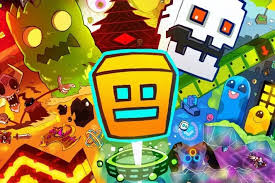In the vast landscape of mobile gaming, few titles have achieved the perfect balance of simplicity, challenge, and addictive gameplay quite like Geometry Dash . This deceptively straightforward rhythm-based platformer has evolved from a modest indie release into a global phenomenon that continues to captivate players years after its debut.

The Beauty of Brutal Simplicity
At first glance, Geometry Dash appears almost childishly simple: guide a geometric shape through a series of obstacles by tapping to jump. That's it. No complex control schemes, no inventory management, no dialogue trees—just you, your reflexes, and a relentlessly advancing level.
Yet within this minimalist framework lies extraordinary depth. The game transforms basic geometric shapes into an intricate dance of precision and timing. Each level is meticulously synchronized to pulsing electronic beats, creating a hypnotic flow state when you're performing well—and chaotic frustration when you're not.
The Art of Productive Failure
What truly sets Geometry Dash apart is its relationship with failure. You will die—thousands of times. A mistimed jump by milliseconds, a momentary lapse in concentration, or a slight misjudgment of an obstacle's position will send your little cube shattering into pieces. Yet each failure feels instructive rather than punishing, pushing you to internalize the level's rhythm more deeply.
The game ingeniously places checkpoints at strategic intervals, creating perfectly sized challenge chunks that make you mutter "just one more try" until hours have somehow vanished. This careful balancing act between difficulty and reward creates one of gaming's most potent dopamine loops.
From Players to Creators
Geometry Dash transcended its original concept by embracing user-generated content. The level editor transformed players into designers, resulting in an ever-expanding universe of challenges ranging from beautiful musical showcases to sadistically difficult gauntlets that only the most elite players can conquer.
The community has developed its own vocabulary and rating system for difficulty, with legendary levels like "Bloodbath" and "Sonic Wave" achieving mythical status. Watching top players complete these seemingly impossible challenges has become entertainment in its own right, spawning dedicated YouTube channels and streaming communities.
The Psychology of "Just One More Attempt"
What explains Geometry Dash's enduring appeal is how it taps into fundamental aspects of human psychology. The game creates a perfect tension between skill and luck, control and chaos. When you fail, you can almost always identify exactly what went wrong—creating the powerful belief that success is just one more attempt away.
This combination of clear feedback, visible improvement, and the tantalizing proximity of success creates a uniquely compelling experience that hooks players across age groups and gaming backgrounds.
More Than Just a Game
For millions of players, Geometry Dash represents more than just entertainment—it's a lesson in persistence, pattern recognition, and the value of incremental progress. When you finally complete a level that once seemed impossible, the rush of accomplishment transcends the digital realm, delivering a genuine sense of growth and mastery.
In a gaming landscape often dominated by complex, time-consuming titles, Geometry Dash remains a brilliant reminder that sometimes the most profound gaming experiences come in the simplest packages—though perhaps "simple" isn't quite the right word for a game that will test your patience, precision, and perseverance to their absolute limits.